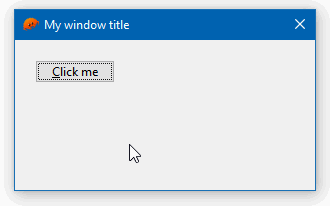Windows API and GUI in safe, idiomatic Rust.
WinSafe has:
- low-level Win32 API constants, functions and structs;
- high-level structs to build native Win32 GUI applications.
WinSafe documentation:
| Branch | Docs |
|---|---|
| Stable | docs.rs/winsafe |
| Nightly (master) | rodrigocfd.github.io/winsafe/winsafe |
| Native FFI item | Count |
|---|---|
| Functions | 782 |
| Structs | 237 |
| Constants | 13,393 |
| Window messages | 655 |
| Handles | 45 |
| COM interfaces | 86 |
| COM methods | 485 |
Although WinSafe already has a lot of Win32 APIs, it doesn't have everything, simply because Win32 API is gigantic. So if you're looking for a comprehensive Win32 coverage, take a look at winapi or windows crates, which are unsafe, but have everything.
- User custom window/dialog – main, modal, modeless, control, message-only.
- Native controls – button, check box, combo box, date and time picker, edit, header, label, list box, list view, month calendar, progress bar, radio button, status bar, tab, track bar, tree view, up down.
Add the dependency in your Cargo.toml:
[dependencies]
winsafe = { version = "0.0.21", features = [] }You can, alternatively, use the Nightly (master) branch directly, to get the latest features right away:
[dependencies]
winsafe = { git = "https://github.com/rodrigocfd/winsafe", features = [] }Then you must enable the Cargo features you want to be included – these modules are named after native Windows DLL and library names, mostly.
The APIs in WinSafe are split into Cargo features to speed up compilation time. Only the features you include will be compiled.
The following Cargo features are available so far:
| Feature | Description |
|---|---|
advapi |
Advapi32.dll and Ktmw32.dll, advanced kernel functions |
comctl |
ComCtl32.dll, the Common Controls |
dshow |
DirectShow |
dwm |
Desktop Window Manager |
dxgi |
DirectX Graphics Infrastructure |
gdi |
Gdi32.dll, the Windows GDI |
gui |
The WinSafe high-level GUI abstractions |
kernel |
Kernel32.dll, basic kernel functions |
mf |
Media Foundation |
ole |
Basic OLE/COM support |
oleaut |
OLE Automation |
shell |
Shell32.dll, Shlwapi.dll, and Userenv.dll, the COM-based Windows Shell |
taskschd |
Task Scheduler |
user |
User32.dll and ComDlg32.dll, the basic Windows GUI support |
uxtheme |
UxTheme.dll, extended window theming |
version |
Version.dll, to manipulate *.exe version info |
graph LR
kernel
kernel --> advapi
kernel --> user
kernel --> version
user --> gdi
user --> ole
gdi --> uxtheme
ole --> oleaut
ole --> comctl
ole --> dxgi
ole --> uxtheme
comctl --> gui
oleaut --> dshow
oleaut --> mf
oleaut --> shell
oleaut --> taskschd
uxtheme --> dwm
uxtheme --> gui
Don't worry about including dependency features. Once you use a feature, Cargo will add and resolve all dependencies automatically.
Note: You can find several examples in the dedicated repo: github.com/rodrigocfd/winsafe-examples
WinSafe allows you to create windows in two ways:
- programmatically defining parameters; or
- loading dialogs from a
.resfile created with a WYSIWYG resource editor.
The example below creates a window with a button programmatically. Note how the click event is handled with a closure:
[dependencies]
winsafe = { version = "0.0.21", features = ["gui"] }#![windows_subsystem = "windows"]
use winsafe::{self as w, prelude::*, gui};
fn main() {
let my = MyWindow::new(); // instantiate our main window
if let Err(e) = my.wnd.run_main(None) { // ... and run it
eprintln!("{}", e);
}
}
#[derive(Clone)]
pub struct MyWindow {
wnd: gui::WindowMain, // responsible for managing the window
btn_hello: gui::Button, // a button
}
impl MyWindow {
pub fn new() -> Self {
let wnd = gui::WindowMain::new( // instantiate the window manager
gui::WindowMainOpts {
title: "My window title".to_owned(),
size: (300, 150),
..Default::default() // leave all other options as default
},
);
let btn_hello = gui::Button::new(
&wnd, // the window manager is the parent of our button
gui::ButtonOpts {
text: "&Click me".to_owned(),
position: (20, 20),
..Default::default()
},
);
let new_self = Self { wnd, btn_hello };
new_self.events(); // attach our events
new_self
}
fn events(&self) {
let wnd = self.wnd.clone(); // clone so it can be passed into the closure
self.btn_hello.on().bn_clicked(move || {
wnd.hwnd().SetWindowText("Hello, world!")?; // call native Windows API
Ok(())
});
}
}Licensed under MIT license, see LICENSE.md for details.



